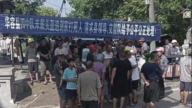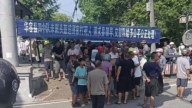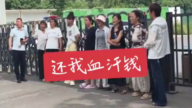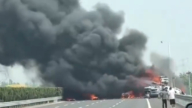【新唐人2014年01月08日讯】继中国新疆和西藏出现群众抗议,近年来,内蒙古也频频爆发民众抗争事件。日前,因抗议国有林场强占牧场的6名蒙古牧民,被中共以“破坏生产经营秩序罪”起诉,6人分别被判1到2年不等的刑期。家属和律师不服判决,决定上诉。数百牧民连续两天到当地政府请愿。
日前,内蒙古自治区翁牛特旗新苏乡嘎查村的6名牧民,因抵制牧场被占的案件开庭。起诉书中指控6人煽动当地牧民,干扰林场人员的工作,造成经济损失,当地法院以“破坏生产经营罪”分别判处6人1到2年徒刑。
被判刑两年的牧民“特古斯巴音”的姐姐“沙布杜”对《新唐人》说,1月4号他们家人就收到了判决书。
内蒙古自治区牧民特古斯巴音姐姐 沙布杜:“家属正准备给他上诉,他本身没罪就判咱们那个啥..罪。”
也被判刑两年的嘎查村村长“图力古日”,他的妻子莎兰高娃说,她1月4号到看守所拿到了判决书,6人都是上个月31号被判决,现在她已委托律师上诉。
内蒙古自治区村长“图力古日”妻子 莎兰高娃:“10天之内,如果上诉的话,他还在看守所里,那个上诉状还未写,律师正好写着。”
当地牧民说,上个月12月30号至31号,有近200名牧民,连续两天到市政府门前,抗议这6人被起诉。
内蒙古自治区牧民胡先生:“我们老百姓问了,到底有什么罪,给我们解释解释,那些区政府领导还没见我们,找他们谈话没接待我们。”
这起案件源于去年6月,一个名为“双合林”的国营林业公司,非法占用牧民的土地放牧,6位牧民因此与中国工人发生冲突。“图力古日”最初的辩护律师“呼和宝力高”,在当地政府胁迫下退出了这起案件。
蒙古族律师呼和宝力高指出,这起案件只是土地纠纷案,6人被刑事处理,这种判决明显不公。
蒙古族律师呼和宝力高:“他们几个应该不构成罪,而且在审判阶段,检察机关的证据严重不足,他这个罪名很勉强的,后来他们把6个公民羁押以后,6个公民当庭都不认罪,后来公、检、法机构天天到看守所做工作,说你认罪我就放你,不认罪我就判你。”
“图力古日”和“特古斯巴音”因拒不认罪被判两年徒刑,另4人在当局胁迫下认罪,但仍被判处1年半监禁,缓期执行。
呼和宝力高指出,这起案件的爆发,一开始就错在国有林场不该去强占牧民的土地。
呼和宝力高:“土地管理法有个规定,比如说,双方土地发生争议以后,双方对有争议的土地现状不能改变,当时土地已经发生了争议,所以应该双方都不得改变土地现状,但是林场职工他们是违法了,我们去制止,应该是合法的行为。”
一位不愿意透露姓名的律师对媒体说,早前村民们曾前往市政府和北京上访,当地政府受到了上级批评,因此他们对这些牧民采用了刑事处理手段。
海外“南蒙古人权信息中心(SMHRIC)”《南蒙古观察》网站引述当地牧民的话说,庭审当天,当局禁止牧民的代理律师出庭辩护,并阻挠数百名牧民前往法庭旁听。
据了解,嘎查村牧民因土地被强占已上访7年,遭到当局的长期监控和迫害。去年,300名牧民就曾针对当地非法卖地及抓捕6名牧民,致函各级政府及检察院等部门,指出当地前党支书记额木格图,以及现任党支书记刘金互相勾结,非法卖掉两万多亩土地。
内蒙古是中国北部资源丰富的省级民族自治区,约占中国总面积的十分之一,拥有中国最大的煤矿储量,人口约2400万人,其中蒙古族不到两成。近年来,内蒙牧民反抗国有矿业公司和林场,强占牧场和土地引起的冲突,时有发生。
去年(2013年)3月,内蒙古通辽市扎鲁特旗牧民因不满数万亩土地被强征,到北京上访,遭当地公安堵村阻截;2011年,一名牧民被矿业公司的卡车轧死事件,曾引发大规模示威。
采访编辑/李韵 后制/李勇
Six Mongols Sentenced for Protesting Against Forced
Grazing Land Grab
Following the ethnic protests in Xinjiang and Tibet, Inner
Mongolia also suffers from grievances.
Six Mongolian herders were recently sentenced one
to two years of imprisonment on a charge of
“sabotaging production management".
While families and lawyers have decided to appeal, hundreds
of local herders have petitioned to the local
Government for two consecutive days.
Recently, a case involving six herders of the Gachaa Village,
Ongniud Banner of Inner Mongolia Autonomous,
went on trial for refusing to give up their grazing land.
The indictment, alleged six local herders had incited local villagers
to interfere with forestry company workers
and causing economic losses.
Six herders were sentenced to one to two years of jail term
on a charge of “sabotaging production management"
by the local courts.
Sobdoo, the sister of one of the accused called Tugusbayar,
told NTD that they’d received the verdict on Jan. 4.
Sobdoo, herder Tugusbayar’s sister, Inner Mongolia Autonomous,
“We are getting ready to appeal. He is not guilty at all."
Sarangowaa, the wife of Tulguur, one of six herders receiving
two years of jail term,
indicated she had received the verdict on Jan. 4,
and the court delivered the verdict on all six herders on Dec. 31.
She has commissioned a lawyer to appeal.
Sarangowaa, the wife of Tulguur, village chief in Inner Mongolia
Autonomous: “Appeal has to be done in 10 days.
He is in the detention center. The lawyer is drafting the appeal."
Nearly 200 herders staged protests in front of city hall on
Dec. 30 and 31 against the charges on the six herders.
Mr. Hu, herder of Inner Mongolia:
“We want an explanation. What kind of crime is it?
None of the local officials would see us.
We have not been able to see any one of them."
A state-owned company, Shuanghe Forestry, was alleged to
illegally occupy grazing land last June.
Conflict broke out between the six herders and the forestry workers.
Tulguur’s former defense attorney, Huhuobaoligao, was forced
to withdraw from defending the case by local government.
Attorney Huhuobaoligao indicates this is more than just
a land dispute but a criminal case.
The verdict is clearly unjust.
Huhuobaoligao, Mongol attorney: “They should not have
been charged.
The prosecution’s evidence was very poor and could not
sustain the charge at all.
After the six citizens were detained, none of them pleaded guilty.
The officials have since tried to persuade them to confess,
claiming, with their confession, they’ll be released,
otherwise, they’ll receive a sentence."
Both Tulguur and Tugusbayar, were sentenced to two years
imprisonment for pleadeding not guilty,
while the other four still received suspended imprisonment
of one and a half years after being
forced to plead guilty.
Huhuobaoligao indicates, the state-owned Forestry should not
have occupied the grazing land to begin with.
Huhuobaoligao: “The Land Management Law has ruled that
no change can be made on the disputed land.
But the Forestry workers have obviously violated the law.
It is supposed to be legal for the herders to stop them from
continuing this exploitation. "
A lawyer who requested anonymity, told Reuters that the
villagers have been going to the municipal
government & Beijing to petition.
The local government has been criticized for this.
They are under great pressure, so they’ve turned it in
to a criminal case.
Southern Mongolian Human Rights Information Center quoted
local herder’s complaint.
On the day of the trial, local authorities prohibited the
defending attorney’s appearance at the court as well as
hundreds of herders to sit in the courtroom.
It is understood that Gachaa villagers have been petitioning for
seven years over the illegally confiscated grazing land.
Villagers have thus been subject to local authorities’ suppression.
Last year, 300 herders protested addressing issues via
local government and procuratorate,
about the illegal land sell and arrest of six herders,
as well as the collusion of local party secretaries selling over
20,000 acres of grazing land.
The resource-rich Inner Mongolia sits in northern China,
accounting for one-tenth of China, harboring
China’s largest coal reserves.
In a population of about 24 million, Mongols are less than 20%.
Recently,conflicts have occurred frequently due to land
grabs by state owned mining and forestry companies.
In March 2013, herders of Jarud Banner, Tongliao City, have
petitioned to Beijing over forced land grabs.
Tens of thousands of acres of grazing land has been exploited,
yet petitioners are always met with blockage
of local police.
In 2011, more mass protests broke out after an ethnic Mongol
herder was killed by a truck,
it is said, he was also taking part in a protest
against pollution caused by a coal mine.
Interview & Edit/LiYun Post-Production/LiYong






























